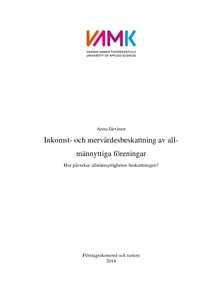Inkomst- och mervärdesbeskattning av allmännyttiga föreningar : Hur påverkar allmännyttigheten beskattningen?
Järvinen, Anna (2016)
Järvinen, Anna
Vaasan ammattikorkeakoulu
2016
All rights reserved
Julkaisun pysyvä osoite on
https://urn.fi/URN:NBN:fi:amk-2016060712309
https://urn.fi/URN:NBN:fi:amk-2016060712309
Tiivistelmä
Syftet med detta lärdomsprov är att behandla allmännyttiga föreningar och hur dessa beskattas både inom inkomstbeskattning och mervärdesbeskattning. Uppfyller en förening kraven för allmännyttig verkan, har föreningen lättnader inom inkomstbeskattningen. En allmännyttig förening kan ha sådan verksamhet som kräver registrering för momsskyldiga och kan även få lättnad inom mervärdesbeskattningen beroende på hur stor verksamheten är. I alla fall är det inte helt tydligt om en förening verkar till allmännyttig fördel, utan det kan variera från fall till fall och det kan vara en tolkningsfråga. Lärdomsprovets teori består av allmän information om hur man grundar en förening, samt vilka kraven är för att en förening skall anses vara allmännyttig. Jag tar även upp inkomstbeskattning och vilka typer av inkomst en allmännyttig förening kan ha och hur dessa inkomster beskattas. Jag redogör för hur man momsregistrerar en förening och vilka förpliktelser som hör ihop med momsregistrering. I undersökningen undersöker jag, vilka tankar och problem som allmännyttiga föreningar har stött på i samband med deras verksamhet. Undersökningen har jag gjort genom att intervjua tre ungdomsföreningar i Österbotten samt Svenska Österbottens Ungdomsförbund, SÖU. Undersökningen visar att det finns fall där verkan för allmännyttighet i samband med beskattning har väckt frågor och tankar bland föreningarna. Det är inte alla gånger klart vad som är allmännyttigt enligt lag utan det är ofta en tolkningsfråga huruvida föreningar är allmännyttiga eller inte. The aim of this thesis is to present what for the public good association is and how these associations are taxed in both income and value added taxes. Does an association fulfil the requirement that the law require for an association to become for the public good, the association will have relief on the income taxes. A for the public good association may have such activity that will request a registration in the register of those who are VAT obligated. In all cases, it is not entirely clear whether an association acts to the public benefit, but it can vary from case to case and it may be a matter of interpretation of the law whether the association acts for the public benefit. The thesis theory consists of general facts about how to found an association and what the requirements are for an association to be considered as an for the public good association. I also go through different types of incomes which an association may have and who these incomes are taxed. I account for how to register the association in the register of VAT obligated and obligations that will come with this registration. In the survey I examine the thoughts and problems regarding taxes different kinds of associations have encountered in connection with their business. The survey in done by interviewing three associations in Ostrobothnia, that acts for public benefit and the youth’s wellbeing, and Svenska Österbottens Ungdomsförbund who is a central organization for these kinds of associations. The survey shows that there are cases where the effect of public benefit in connection with the taxation has raised questions and thoughts. There are not always clear what public good is according to the law and it is often a matter of interpretation of the law whether the association is for the public good or not.
